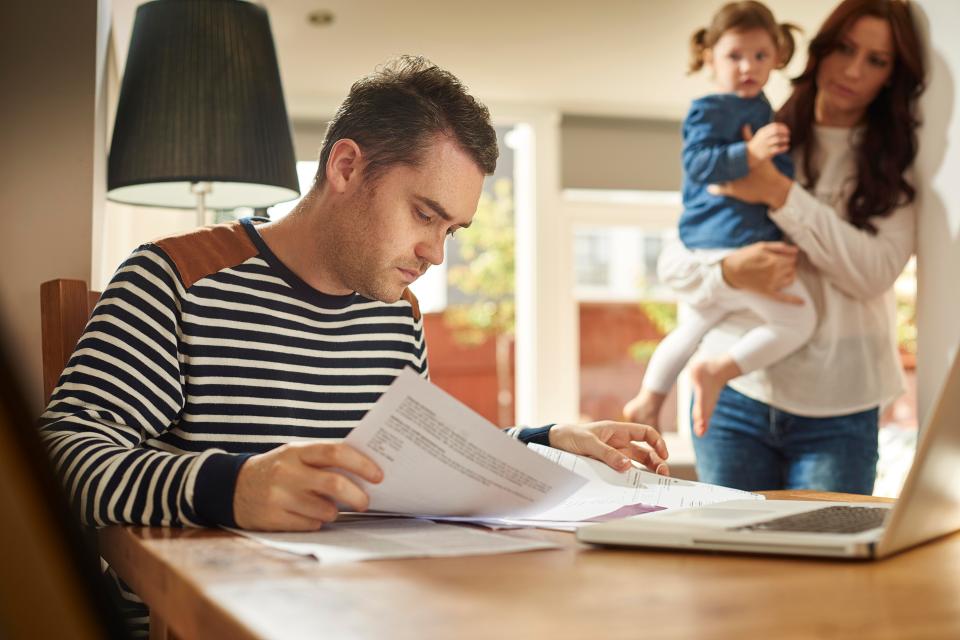How to get out of debt in eight simple steps – and get advice for free

MILLIONS in the UK rely on costly credit to plug holes in their finances, with an estimated 26.9million people starting the New Year in debt.
The average household debt now stands at £8,088 not including any mortgage debt - with mortgages it's £59,840 per family.
Credit card debt alone averaged at £1,373 per person, according to the Money Charity's monthly statistics.
Unsurprisingly, many families are struggling and concerned that a small change in circumstances could land them in serious financial trouble.
Fortunately, if you've got debts hanging over you, there are things you can do. Here's our eight-step guide to getting back on track.
Work out what you owe
It can be really tempting to simply ignore your bills and stick your head in the sand about how much you owe.
But that won't make the problem go away - in fact, it will only make it much worse.
The first step to sorting your finances is to write down a list of all your debts, how much is outstanding, what the interest rate is and when you're meant to repay.
Make sure you include credit cards, mortgages, loans, phone plans, store cards and credit cards.
This will give you a realistic picture of your finances. If you owe more than you expected, don't panic.
Make a budget and prioritise
The next step is to make a detailed budget so you can see how much you have coming in and going out each month.
Detail all of your income as well as how much you are spending and what it is being spent on.
There are useful tools online, like this that can help you.
Having a proper budget will help you figure out how much you can realistically afford to pay towards your debts each month.
If you can make cutbacks, the money can go towards paying down your debts.
Some bills like your rent, mortgage or council tax are classed as priority bills as if you fail to pay them you could be left homeless or end up in court.
Make sure you deal with these important debts first.
Then you should prioritise any debts that have high interest rates on them as the quicker you pay these off, the less money you well end up spending.
How to switch suppliers and save £300
SWITCHING suppliers is the best way you can cut your energy bills. Here's what you need to do:
1. Shop around - If you're on an expensive Standard Variable Tariff (SVT) deal you are throwing away up to £300 a year.
Use a comparion site like MoneySuperMarket.com or EnergyHelpline.com to see what best deals are available to you.
The cheapest deals are usually found online and are fixed deals - meaning you'll pay a fixed amount usually for 12 months.
2. Switch - When you've found one, all you have to do is contact the new supplier.
It helps to have the following information - which you can find on your bill - to hand to give the new supplier.
- Your postcode
- Name of your existing supplier
- Name of your existing deal and how much you pay
- An up-to-date meter reading
It will then notify your current supplier and begin the switch.
It should take no longer than three weeks to complete the switch and your supply won't be interrupted in that time.
3. Keep checking - Make a note of when your new deal ends, so that you can switch before you get stuck on an SVT again next year.
There are services, such as that will monitor energy company prices to see if you're on the best deal and automatically switch you if you could save money. This takes lots of the hassle oout of monitoring your bills.
Slash your household bills
Your budget will not only reveal what luxuries you can cut back on, but also if you're paying too much for your household bills.
Brits are being overcharged by as much as £300 a year by their energy suppliers by being stuck on expensive Standard Variable Tariffs (SVTs) instead of cheaper deals.
And it's not just energy where you can switch and save, shopping around for broadband, home insurance, car insurance and phone providers can also save you hundreds.
Make sure you check your mortgage too if you have one to make sure you're getting the best deal.
Luckily, switching suppliers is fairly straightforward and doesn't take too long.
Use a comparison site like MoneySuperMarket or Energyhelpline to see what cheaper deals are available.
You can also slash the cost of your weekly shop by comparing different supermarkets using mysupermarket.com. Consider using discounters Aldi and Lidl too.
Try swapping from branded goods to supermarket own, the individual savings are small but they soon stack up.
See if you're entitled to any benefits
It’s worth checking if you’re entitled to certain benefits or tax credits depending on your income and personal circumstances.
The benefits system in the UK is complex but it's important that you get what you're entitled to - go to to see what help you can get.
There are also some useful calculators that help you work out what you might qualify for.
For instance, this tool from helps you sort out income-related benefits, tax credits, contribution-based benefits, Council Tax Reduction, Carer’s Allowance and Universal Credit.
It explains what you should get, how to claim and even how your benefits will be affected if you work more hours.
For instance, you might be able to cut the cost of your council tax bill, depending on if you qualify for help.
Get a balance transfer card
If you're paying interest on your credit card balance, you should look at getting a 0 per cent balance transfer card.
These types of card will let you transfer an existing balance to a new card where you won't have to pay any interest for a introductory period (often more than a year).
This gives you the chance to clear your debts fully without having to pay heavy interest bills.
You usually only get the 0 per cent interest on the transferred balance, not on any new spending - so be sure to not spend on this card.
Make sure keep up with your repayments and pay off the balance before the interest-free period ends.
will let you know what deals you will likely qualify for.
Only those with excellent credit histories will get accepted for the best deals.
So when you apply, you could be accepted by the provider but be offered a smaller 0 per cent period.
Remember to always try and clear your balance before the period ends - lenders rely on you failing to do this so they can start charging you interest, typically at a rate of between 15 - 25 per cent.
If you still have some of the balance remaining when the deal ends, think about applying for a new 0 per cent card to transfer the balance again.
Make extra cash
Selling unwanted items and Christmas presents online can be a decent way of earning a little extra cash on the side.
Have a look around your house for any items you no longer use or want - clothes, DVDs, books - and put them on sale.
You can even sell things like old remotes, wedding dresses and old gold.
You might not make a fortune from them - but every little helps when it comes to paying down your bills.
If you're selling on eBay, make sure you set a reserve price, otherwise you might get less than what you wanted for your items.
You can also consider other ways to make extra cash such as taking a lodger, renting out your parking space, and being paid for filling out surveys online.
How to cut the cost of your debt
IF you're in large amounts of debt it can be really worrying. Here are some tips from Citizens Advice on how you can take action.
Check your bank balance on a regular basis - knowing your spending patterns is the first step to managing your money
Work out your budget - by writing down your income and taking away your essential bills such as food and transport
If you have money left over, plan in advance what else you’ll spend or save. If you don’t, look at ways to cut your costs
Pay off more than the minimum - If you’ve got credit card debts aim to pay off more than the minimum amount on your credit card each month to bring down your bill quicker
Pay your most expensive credit card sooner - If you have more than one credit card and can’t pay them off in full each month, prioritise the most expensive card (the one with the highest interest rate)
Prioritise your debts - If you’ve got several debts and you can’t afford to pay them all it’s important to prioritise them
Your rent, mortgage, council tax and energy bills should be paid first because the consequences can be more serious if you don't pay
Get advice - If you’re struggling to pay your debts month after month it’s important you get advice as soon as possible, before they build up even further
Groups like Citizens Advice and Money Advice Trust can help you prioritise and negotiate with your creditors to offer you more affordable repayment plans
Speak to your creditors
If you've done all you can to cut down on your spending and you're still struggling to make ends meet, then it's worth contacting your creditors to see what they can do to help.
You'll have to explain why you're in debt, what steps you're taking to get yourself out of the situation and how much you can afford to pay back.
Your lenders should try and help you, but if they don't agree to a repayment plan, you should contact a charity like StepChange or Citizens Advice.
Contact a debt charity
If you've taken all the steps above and you still can't manage your debts, you should speak to a debt charity like StepChange or National Debtline.
StepChange says 331,337 new people contacted it for help with their problem debt in the first half of 2018, which was its busiest ever start to a year.
Charities can help you in a number of ways including creating a free debt management plan and contacting your creditors to come up with affordable repayments.
Debt Management Plans (DMP), Debt Relief Orders (DRO) and Individual Voluntary Arrangements (IVA) can all help cut the cost of your debts - but the agreements are not to be taken lightly and aren't suitable for everyone.
How to get help for free
THERE are lots of groups who can help you with your problem debts.
- Citizens Advice - 0808 800 9060
- StepChange - 0800 138 1111
- National Debtline - 0808 808 4000
- Debt Advice Foundation - 0800 043 4050
You can also find information about Debt Management Plans (DMP) and Individual Voluntary Arrangements (IVA) on the and on the Government's
Speak to one of these organisations - don't be tempted to use a claims managment firm that will claim it can write-off lots of your debts in return for a large up-front fee.
More on money
Tesco slashes hundreds of prices in huge January sale, including discounts on big-name brands and bottles of wine for under a fiver.
Best websites to look for a new job – and how to make sure you get a pay rise.
Mum explains how to get £25 worth of Morrisons food for just £3 using food waste app.













